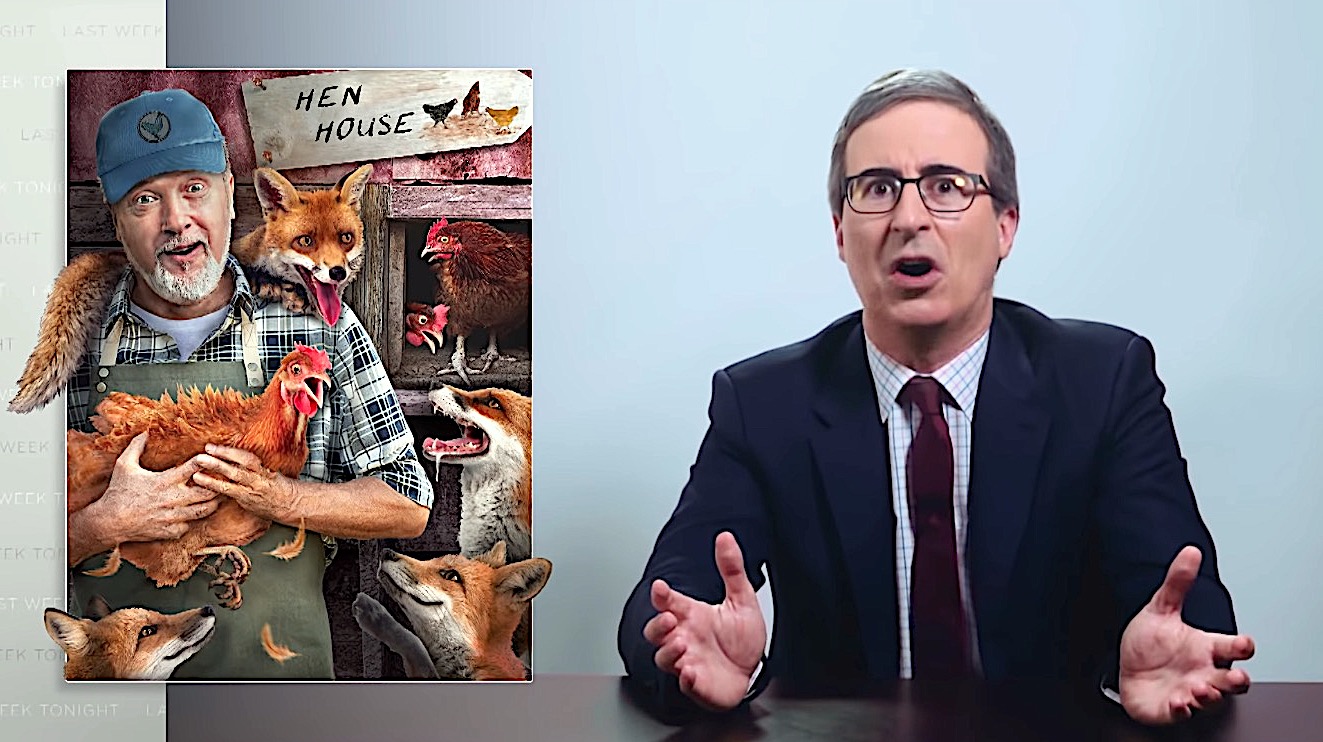John Oliver explains why you should fear facial recognition technology, offers an easy way to fight back


A free daily email with the biggest news stories of the day – and the best features from TheWeek.com
You are now subscribed
Your newsletter sign-up was successful
"Our main story tonight involves facial recognition," John Oliver said on Sunday's Last Week Tonight. "The technology behind facial recognition has been around for years, but recently, as it has grown more sophisticated, its applications have expanded greatly," bringing "a host of privacy and civil liberties issues." To demonstrate "just how terrifying" the technology can be, Oliver highlighted a Russian stalker app. "One of the biggest users of facial recognition is, perhaps unsurprisingly, law enforcement," he said, and there's a good chance the FBI has searched your face.
"There are currently very serious concerns that facial recognition is being used to identify Black Lives Matter protesters," which is "a pretty sinister way to undermine the right to assemble," Oliver said. "So tonight, let's take a look at facial recognition," which "governments all over the world have been happily rolling it out," even though "there haven't been many rules or a framework in place for how it is used."
China's embrace of facial recognition had escalated into a "terrifying level of surveillance," Oliver said. "Imagine the Eye of Sauron, but instead of scouring Middle Earth for the one ring, he was just really into knowing where all his orcs like to go to dinner." The technology is already being used in the U.S., too, despite being "very much a work in progress," he said. And "we're about to cross a major line."
The Week
Escape your echo chamber. Get the facts behind the news, plus analysis from multiple perspectives.

Sign up for The Week's Free Newsletters
From our morning news briefing to a weekly Good News Newsletter, get the best of The Week delivered directly to your inbox.
From our morning news briefing to a weekly Good News Newsletter, get the best of The Week delivered directly to your inbox.
That line is Clearview.ai. Founder Hoan Ton-That's "willingness to do what others have not been willing to do — and that is scrape the whole internet for photos — has made his company a genuine game-changer in the worst possible way," Oliver said. "The notion that someone can take your picture and immediately find out everything about you is alarming enough, even before you discover that over 600 law enforcement agencies have been using Clearview's service. And you're probably in that database, even if you don't know it," and even if your account is private, because the company has discarded cease-and-desist letters from Twitter, YouTube, and Facebook, claiming a nonresistant "First Amendment right to harvest data from social media."
Some cities and states are stepping up, but we need "a comprehensive, nationwide policy" on using facial recognition, "and we need it right now," Oliver said. In the meantime, he suggested you send Clearview — and law enforcement — a message by posting special photos to social media. Peter Weber

A free daily email with the biggest news stories of the day – and the best features from TheWeek.com
Peter has worked as a news and culture writer and editor at The Week since the site's launch in 2008. He covers politics, world affairs, religion and cultural currents. His journalism career began as a copy editor at a financial newswire and has included editorial positions at The New York Times Magazine, Facts on File, and Oregon State University.
-
 Political cartoons for February 16
Political cartoons for February 16Cartoons Monday’s political cartoons include President's Day, a valentine from the Epstein files, and more
-
 Regent Hong Kong: a tranquil haven with a prime waterfront spot
Regent Hong Kong: a tranquil haven with a prime waterfront spotThe Week Recommends The trendy hotel recently underwent an extensive two-year revamp
-
 The problem with diagnosing profound autism
The problem with diagnosing profound autismThe Explainer Experts are reconsidering the idea of autism as a spectrum, which could impact diagnoses and policy making for the condition
-
 ‘One Battle After Another’ wins Critics Choice honors
‘One Battle After Another’ wins Critics Choice honorsSpeed Read Paul Thomas Anderson’s latest film, which stars Leonardo DiCaprio, won best picture at the 31st Critics Choice Awards
-
 A peek inside Europe’s luxury new sleeper bus
A peek inside Europe’s luxury new sleeper busThe Week Recommends Overnight service with stops across Switzerland and the Netherlands promises a comfortable no-fly adventure
-
 Son arrested over killing of Rob and Michele Reiner
Son arrested over killing of Rob and Michele ReinerSpeed Read Nick, the 32-year-old son of Hollywood director Rob Reiner, has been booked for the murder of his parents
-
 Rob Reiner, wife dead in ‘apparent homicide’
Rob Reiner, wife dead in ‘apparent homicide’speed read The Reiners, found in their Los Angeles home, ‘had injuries consistent with being stabbed’
-
 Hungary’s Krasznahorkai wins Nobel for literature
Hungary’s Krasznahorkai wins Nobel for literatureSpeed Read László Krasznahorkai is the author of acclaimed novels like ‘The Melancholy of Resistance’ and ‘Satantango’
-
 Primatologist Jane Goodall dies at 91
Primatologist Jane Goodall dies at 91Speed Read She rose to fame following her groundbreaking field research with chimpanzees
-
 Florida erases rainbow crosswalk at Pulse nightclub
Florida erases rainbow crosswalk at Pulse nightclubSpeed Read The colorful crosswalk was outside the former LGBTQ nightclub where 49 people were killed in a 2016 shooting
-
 Trump says Smithsonian too focused on slavery's ills
Trump says Smithsonian too focused on slavery's illsSpeed Read The president would prefer the museum to highlight 'success,' 'brightness' and 'the future'
